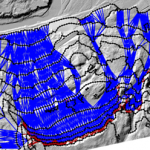This October, the Supreme Court will hear a landmark case on the repeal of the Professional and Amateur Sports Protection Act (PASPA) passed by Congress in 1992. The act prohibits sports betting in all states except Nevada, Oregon, Montana, and Delaware. These states were grandfathered in, and therefore exempt to the law.
The case started in New Jersey, one of several states that wants to legalize sports betting. However, several other states support the New Jersey lawsuit for entirely different reasons: they believe the law oversteps the powers of Congress and violates the tenth amendment.
No matter what reason the states support the repeal of PASPA, the action will have a real effect almost immediately across the country, and right in the heart of the NFL season, the most gambled on sport in the world.
Here are what the maps look like, and what they mean:
Only four states were grandfathered in under the PASPA law, and are the only states in the United States where sports betting is technically legal. This law covers at its strictest interpretation side bets with your co-workers, football pools, and of course full on sports betting.
There is some debate, however, over Daily Fantasy Sports and whether or not it constitutes betting. The map below shows where you can currently engage in Daily Fantasy Sports and where you can’t:
Many groups are most concerned about daily fantasy sports like Fan Duel when it comes to student sports. While many leagues, including the NBA are in favor of eliminating PASPA because of the potential revenue they might gain, the NCAA is opposed to it, as the league feels there would be more incentive for players to cheat or throw games.
Several states have introduced legislation to block Daily Fantasy Sports related to student sports, but only two so far have passed that legislation.
Of course, even former President Barack Obama said if he were caught betting on sports he would pardon himself, and most people take the letter of the law as somewhat of a joke. It does have a legitimate effect on casinos and online gambling sites, both of which must abide by the PASPA provisions or face stiff penalties from the Federal government.
A few states around the country have signed on to support New Jersey in their fight against the law, but not because they necessarily support sports betting. These states believe PASPA is an overreach of the Federal government under the 10th amendment for a couple of reasons.
First, the Constitution grants all rights to the states not explicitly given to the Federal government by the Constitution. This includes not only sports betting, but things like the legalization of marijuana and other laws that Congress encourages states to make under a policy called cooperative federalism.
This policy is not mandatory though: it is something states voluntarily do. Essentially it means the states all agree to pass a law that Congress wants to be a national standard. However, Congress is then not politically responsible, the states are, and voters often disagree with the legislation. In the case of sports betting, some states have seen the potential income from the legalization of the practice, and so want the right to legalize it in their state.
The likely outcome of a repeal would be that nearly every state that has a lottery or casinos would legalize sports betting. It is easier to name states that do not have a lottery rather than those who do, since there are only seven:
However, not every state that has a lottery will support sports betting even if they support the repeal of PASPA. This is what the map may look like post-repeal, should the court strike down the law in October.
In the middle of a Trump presidency fraught with controversy around all kinds of subjects, sports gambling may be legalized during his first term. This could change the map of where and how bets can be placed on your favorite sports team.
It may mean more than that though. The ruling would affect how states make all kinds of different laws, and many state Governors and Attorney Generals will see this as a huge political victory.
Author:
Troy Lambert is a freelance writer, editor, and non-profit consultant by day, and a suspense thriller author by night. He learned about the power of GIS while working as a researcher at a museum, and is always looking for ways to apply this technology and big data in new and innovative ways. Troy is an avid cyclist, skier, and hiker. He lives, works, and plays in Boise, Idaho. His work can be found at troylambertwrites.com, and you can connect with him on Twitter @tlambertwrites.







